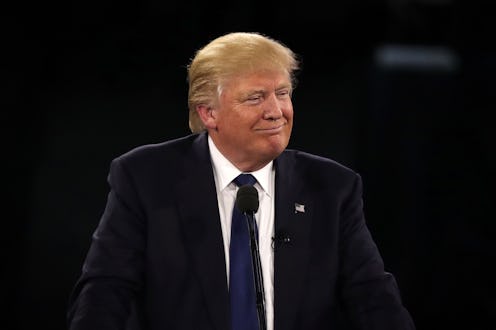News
Can Trump Win Without Getting The Most Delegates?
Of all the uncertainties in the 2016 race, one looms large above all others: Will Donald Trump win 1,237 delegates? That’s the magic number he needs to avoid a contested convention and win the nomination outright, and if the current trajectory continues, it will be an incredibly close race that comes down to the wire. If he falls short, is that it? Or can Donald Trump can get the nomination without winning the most delegates in the primaries?
In fact, he can. There are a few scenarios wherein Trump could win fewer than 1,237 delegates but still become the Republican nominee. The most likely one centers on the mad dash to win over unbound delegates before the convention starts.
Most of the delegates in the GOP race are allocated through primaries and caucuses. This means that they have to vote for whichever candidate their state’s voters supported. But some Republican delegates will be unbound when the convention starts. These delegates can vote for whichever candidate they please, and if the delegate math is extremely close, they could tip the scales one way or the other and decide the nomination.
This is why Trump’s campaign — and every campaign, by the way — is drafting plans to win over these unbound delegates in the 40 day period between June 7, the day of the last primary, and July 18, when the convention starts. There are a number of means by which Trump might convince unbound delegates to vote for them: Everything from paying for delegates’ travel costs to promising cabinet appointments is on the table, and as Sasha Issenberg has pointed out, it may even be legal for delegates to literally sell their votes for cash.
The exact number of unbound Republican delegates will be determined in part by primary votes that haven’t taken place yet, but there will probably be between 100 and 200 of them at the convention. If Trump were to win, say, 1,200 delegates in the primaries themselves, he’d only need to convince a minority of the uncommitted delegates to vote for him in order to bring him over the 1,237 threshold, which would clinch the nomination without winning enough delegates in the primaries.
It’s also possible that Trump could fall short of the magic number in the primaries but triumph at a contested convention. This, however, is a much more unlikely, because in a contested convention, all of the delegates will be up for grabs, including the ones Trump has already won. That means he wouldn’t just have to flip 50 delegates here and there to get the nomination; he’d have to convince 1,237 delegates in total, starting from the ground up, to vote for him. With two other candidates trying to do the same thing, that would be a much, much tougher haul.
Either way, the point is the same: Trump can become the GOP presidential nominee without winning the majority of delegates in the primaries. Democrats have more uncommitted delegates than Republicans, and as such, they tend to get the most media attention. But thanks to the closeness of the GOP race this year, the unbound delegates on the Republican side are much more likely to play a pivotal role in the election.
